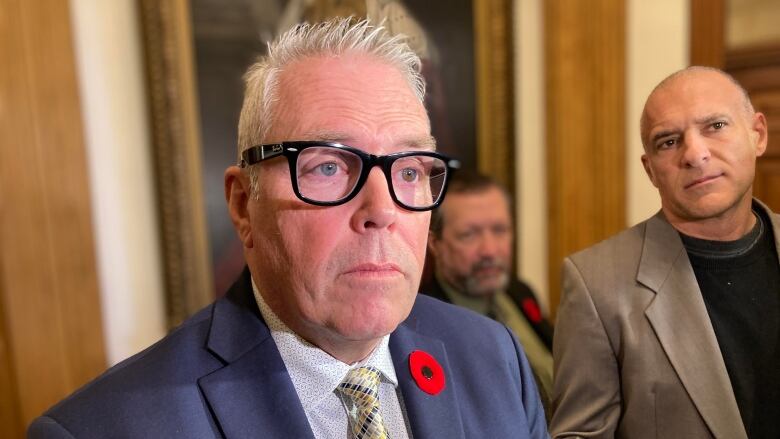New Brunswick headed to fourth major budget surplus in a row
Finance minister says flood of sales tax revenue behind $247 million surplus

New Brunswick is projecting a budget surplus for the current fiscal year of nearly a quarter of abillion dollars, six times higher than originally planned and despite surging health-care expenses, new figures show.
In a third-quarter fiscal update delivered Thursday, New Brunswick Finance Minister Ernie Steeves said a torrent of unexpected sales tax revenue is helping to absorb significant cost overruns in several government departments, especially in the Department of Health, with enough left over to produce the province's fourth significant budget surplus in a row.
Steeves acknowledged an expected surplus of $247.4 millionby the end of the current fiscal year on March 31 is well beyond the $40.3 million he budgeted for.
He said unexpected revenues being forwarded by the federal government are difficult to plan for.
The Liberal finance critic,Bathurst West-BeresfordMLARenLegacy, calledthe large budget surplus "predictable" given what happened in the three previous budget years.
He chastised the provincial government for hoarding money when there arepressing social and economic needs inNew Brunswick.
"We have a housing crisis, a health care crisis, our infrastructure is depreciatingat a faster rate than we are maintaining it, and that's just some of the problems we have," Legacy said.
"We need bold action to start correcting some of these situations."
Frustrated with federal revenue projections
"We're doing the best we can," Steevessaid about the large surplus. "It's still better than a deficit, but I'd rather it be $40 million than above."
If current projections hold it will be the fourth major surplus in a row presided over by Steeves, including a $400 million excess in 2021, $769 million in 2022 and $1.01 billion last year.
That is $2.4 billion in budget surpluses in four years. That is nowhere near what Steeves put forward in budgets for those four years, which together projected a small four-year budget deficit of $78 million.
In comments to reporters,Steeves expressed some frustration with the wide differences between his budgeted and actual results and blamed much of the issue on the federal government, which collects both income and sales taxes for New Brunswick.
Minister asks Freeland for change
This year in a December revision, HST revenues for New Brunswick calculated by the federal government rose to $2.25 billion, $346.6 million more than the province was told to expect last year.
Steeves said he has written to federal Finance Minister Chrystia Freeland to see if a better system can be devised to limit large swings in revenue to help him in his budgeting.
"I've asked her can the federal government consider a review of the current process and explore better ways that this can be done," he said.
Despite those frustrations, Steeves was happy to have the extra money as government expenses are also running well over budget.
Spending in the Health Department is expected to touch $3.8 billion by the end of March, or $212.4 million above original estimates. Four other departments, including Natural Resources, Social Development, Post-Secondary Education and Labour, and Finance are all $40 million or more over budget.
The fiscal update also shows this year'selevated surplus will allow for a $62.4-million reduction in New Brunswick's accumulated debt ratherthan an increase as was originally announced.The debt is now projected to end the year at $12.36 billion, down $2.01 billion since 2020.












_(720p).jpg)


 OFFICIAL HD MUSIC VIDEO.jpg)
.jpg)



























































































